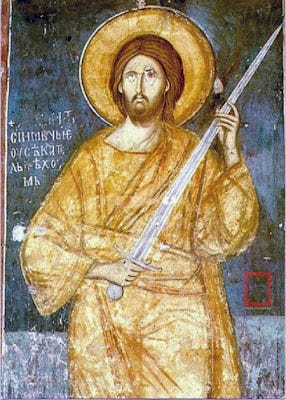scenes from Holy Week: Tuesday
The seven days after Palm Sunday leading to Easter are sometimes called “Holy Week,” and each day presents scene or episodes that I think over and contemplate and I would like to invite readers to do that with me.
Tuesday, under the sign of Mars, marks a day of action. As the Sun is to the planets, so is Christ to the archetypes and thus the Jews are not entirely wrong when they expect the Messiah to return in martial prowess. But as Christ says, “my kingdom is not of this world.” And yet the other world is also this one, though for adults, this identity is often only palpable in extraordinary circumstances. Then it can be grasped that the distance is not one of space but of states of consciousness and that the Divine is the same kingdom, the same power, and the glory, experienced in the mode of unity as the ten-thousand things and other multiplying villainies of nature are in the mode of diversity.
the Many and the One
Experience is “layered” or “doubled” since the experience of every object is also the experience of the subject who experiences that object and the subject is known non-dually in every act of cognition: one can say that the subject is like the cloth from which all the particular objects of experience are then cut out.
A Temple and everything contained and symbolized thereby, embodies the interpenetration of this world with the world beyond. This, then, is where we should expect to behold Christ in his martial aspect and, indeed, in one of the rare omnioptical consiliences among the Evangelists, we find the iconic “turning of the tables of the moneylenders in the temple attested in each of the four Gospels:
Matthew 21:
12And Jesus went into the temple of God, and cast out all them that sold and bought in the temple, and overthrew the tables of the moneychangers, and the seats of them that sold doves, 13And said unto them, It is written, My house shall be called the house of prayer; but ye have made it a den of thieves.
14And the blind and the lame came to him in the temple; and he healed them. 15And when the chief priests and scribes saw the wonderful things that he did, and the children crying in the temple, and saying, Hosanna to the Son of David; they were sore displeased, 16And said unto him, Hearest thou what these say? And Jesus saith unto them, Yea; have ye never read, Out of the mouth of babes and sucklings thou hast perfected praise? 17And he left them, and went out of the city into Bethany; and he lodged there.
Mark 11:
15And they come to Jerusalem: and Jesus went into the temple, and began to cast out them that sold and bought in the temple, and overthrew the tables of the moneychangers, and the seats of them that sold doves; 16And would not suffer that any man should carry any vessel through the temple. 17And he taught, saying unto them, Is it not written, My house shall be called of all nations the house of prayer? but ye have made it a den of thieves. 18And the scribes and chief priests heard it, and sought how they might destroy him: for they feared him, because all the people was astonished at his doctrine.
19And when even was come, he went out of the city.
Luke 19:
45And he went into the temple, and began to cast out them that sold therein, and them that bought; 46Saying unto them, It is written, My house is the house of prayer: but ye have made it a den of thieves.
John 20:
13And the Jews’ passover was at hand, and Jesus went up to Jerusalem, 14And found in the temple those that sold oxen and sheep and doves, and the changers of money sitting: 15And when he had made a scourge of small cords, he drove them all out of the temple, and the sheep, and the oxen; and poured out the changers’ money, and overthrew the tables; 16And said unto them that sold doves, Take these things hence; make not my Father's house an house of merchandise. 17And his disciples remembered that it was written, The zeal of thine house hath eaten me up. 18Then answered the Jews and said unto him, What sign shewest thou unto us, seeing that thou doest these things? 19Jesus answered and said unto them, Destroy this temple, and in three days I will raise it up. 20Then said the Jews, Forty and six years was this temple in building, and wilt thou rear it up in three days? 21But he spake of the temple of his body. 22When therefore he was risen from the dead, his disciples remembered that he had said this unto them; and they believed the scripture, and the word which Jesus had said.
“Tuesday,” the third day of the week, as many readers may know, is named after the Nordic and Germanic god Týr in English, while in most of the Romance languages, it takes its name from Mars, as has already been indicated. Týr is a renowned among the Æsir as a master swordsman and he achieves the pinnacle of glory when he sacrifices his right hand to the wolf Fenrir, who bites it off when he realizes the Æsir have successfully bound him till Judgement Day. God, of course, sacrifices his own right hand, and more, to the Prince of this World when he sends his Son into it. Christ scandalizes everyone who tries to fit God into their own one-sided images of him, as, for instance, a pacifist. This was demonstrated in his treatment of the usurers inside the temple, and stated explicitly earlier: “Think not that I am come to send peace on earth: I came not to send peace, but a sword”1—an image which is later unfolded in the Revelation of John:
11And I saw heaven opened, and behold a white horse; and he that sat upon him was called Faithful and True, and in righteousness he doth judge and make war. 12His eyes as a flame of fire, and on his head were many crowns; and he had a name written, that no man knew, but he himself. 13And he was clothed with a vesture dipped in blood: and his name is called The Word of God. 14And the armies in heaven followed him upon white horses, clothed in fine linen, white and clean. 15And out of his mouth goeth a sharp sword, that with it he should smite the nations: and he shall rule them with a rod of iron: and he treadeth the winepress of the fierceness and wrath of Almighty God. 16And he hath on vesture and on his thigh a name written, KING OF KINGS, AND LORD OF LORDS.
Again, to underscore the point, Christ is the power and the glory and the fruition of all the archetypes, even unto whom Homer calls “battle-frenzied Mars.” “The pen is mightier than the sword,” it is often said, by why so mightier? Because the pen can adduce the word, and the word can adduce the truth. In this world, Christ appeared to many as a mendicant, or a carpenter, or a common criminal, whereas in the Upper World, he sits at the right hand of the Father as King of King and Lord of Lords. In this world, as noted in Sunday’s contemplation, Christ rode upon a donkey in meekness but there, a white horse and in righteousness he doth judge and make war.
Tuesday
planet: Mars
quality: action
color: red
vowel: ae
organ: gallbladder
metal: iron
tree: oak

Matthew 10:34



I like this final paragraph very much:
"Again, to underscore the point, Christ is the power and the glory and the fruition of all the archetypes, even unto whom Homer calls “battle-frenzied Mars.” “The pen is mightier than the sword,” it is often said, by why so mightier? Because the pen can adduce the word, and the word can adduce the truth. In this world, Christ appeared to many as a mendicant, or a carpenter, or a common criminal, whereas in the Upper World, he sits at the right hand of the Father as King of King and Lord of Lords. In this world, as noted in Sunday’s contemplation, Christ rode upon a donkey in meekness but there, a white horse and in righteousness he doth judge and make war."
In my experience, it is the ability to adduce the truth, and not merely induce it, which can be very subjective, that becomes the path of being an objective human being. Objectivity must always be in the forefront of any relevant consideration, and then the word "adduced" by the thought, or the pen, goes into action as the "piercing agent that rends the veil of obscurity". To adduce is to get behind the Maya of the outer-external phenomena.